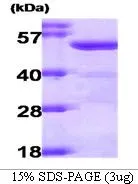
3 microg of GTX66919-pro Human ALDH2 protein (active) by SDS-PAGE under reducing condition and visualized by coomassie blue stain
Human ALDH2 protein (active)
GTX66919-PRO
Product group Molecular Biology
Overview
- SupplierGeneTex
- Product NameHuman ALDH2 protein (active)
- Delivery Days Customer9
- Application Supplier NoteSpecific activity is > 250 pmol/min/microg, and was obtained by measuring the increase of NADH in absorbance at 340 nm resulting from the reduction of NAD at pH 8.0 at 25C.
- ApplicationsFunctional Assay
- CertificationResearch Use Only
- Concentration1 mg/ml
- ConjugateUnconjugated
- Scientific DescriptionThis protein belongs to the aldehyde dehydrogenase family of proteins. Aldehyde dehydrogenase is the second enzyme of the major oxidative pathway of alcohol metabolism. Two major liver isoforms of aldehyde dehydrogenase, cytosolic and mitochondrial, can be distinguished by their electrophoretic mobilities, kinetic properties, and subcellular localizations. Most Caucasians have two major isozymes, while approximately 50% of East Asians have the cytosolic isozyme but not the mitochondrial isozyme. A remarkably higher frequency of acute alcohol intoxication among East Asians than among Caucasians could be related to the absence of a catalytically active form of the mitochondrial isozyme. The increased exposure to acetaldehyde in individuals with the catalytically inactive form may also confer greater susceptibility to many types of cancer. This gene encodes a mitochondrial isoform, which has a low Km for acetaldehydes, and is localized in mitochondrial matrix. Alternative splicing results in multiple transcript variants encoding distinct isoforms.[provided by RefSeq, Nov 2016]
- Storage Instruction-20°C or -80°C,2°C to 8°C
- UNSPSC12352204
